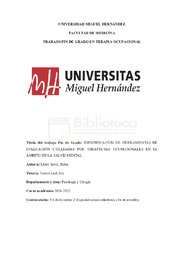Por favor, use este identificador para citar o enlazar este ítem:
https://hdl.handle.net/11000/36423Registro completo de metadatos
| Campo DC | Valor | Lengua/Idioma |
|---|---|---|
| dc.contributor.advisor | Juárez Leal, Iris | - |
| dc.contributor.author | Lledó Selva, Edita | - |
| dc.contributor.other | Departamentos de la UMH::Patología y Cirugía | es_ES |
| dc.date.accessioned | 2025-04-08T11:10:58Z | - |
| dc.date.available | 2025-04-08T11:10:58Z | - |
| dc.date.created | 2024-11-26 | - |
| dc.identifier.uri | https://hdl.handle.net/11000/36423 | - |
| dc.description.abstract | La evaluación es tanto la primera toma de contacto con los usuarios, como una de las partes más importantes del proceso de la terapia ocupacional cuyo fin es la correcta y más adecuada forma de plantear todo el proceso de intervención. El objetivo de esta investigación es la identificación de las herramientas de evaluación más utilizadas por los terapeutas ocupacionales en el ámbito de la salud mental, así como conocer qué áreas o aspectos a evaluar no se dispone de herramientas y/o escalas de evaluación específicas para este ámbito. Se realizó una encuesta ad hoc online de 8 preguntas al que se le dio difusión para conseguir el mayor número posible de terapeutas ocupacionales que trabajan en el ámbito de la salud mental en el territorio español. Participaron 103 personas de 16 comunidades autónomas distintas, principalmente de Madrid y la Comunidad Valenciana, pertenecientes a distintos recursos y centros, con mayor porcentaje de profesionales en Hospitales. Los resultados muestran que las herramientas más usadas por los profesionales son el Listado de Intereses, el Listado de Roles, la escala de Lawton y Brody, la OPHI-II y el Cuestionario de Ocio. Además, expresaron la necesidad de creación de herramientas para evaluar diferentes aspectos como la sexualidad, la relación familiar y social, la historia vital y roles desempeñados en ella, percepción de su propia salud mental y expectativas de su propia recuperación, funcionamiento ocupacional de personas con ideas suicidas, entre otras. En cuanto a los motivos para no usar determinadas herramientas de evaluación alrededor del 30% de los encuestados consideran que no pueden localizar las pruebas estandarizadas que necesitan. Los resultados de este estudio permiten concluir que se han cumplido tanto el objetivo principal como el secundario. Se han identificado las herramientas de evaluación más utilizadas por los terapeutas ocupacionales en salud mental, así como las necesidades específicas en cuanto a herramientas y escalas de evaluación. | es_ES |
| dc.description.abstract | Evaluation is both the first point of contact with users and one of the most important parts of the occupational therapy process, as it determines the correct and most appropriate way to approach the entire intervention process. The aim of this research is to identify the most commonly used assessment tools among occupational therapists in the field of mental health, as well as to determine which areas or aspects lack specific tools and/or scales for this context. An ad hoc online survey consisting of 8 questions was disseminated to reach as many occupational therapists working in the field of mental health in Spain as possible. A total of 103 individuals from 16 different autonomous communities participated, primarily from Madrid and the Valencian Community, representing various resources and centers, with the highest percentage of professionals working in hospitals. The results show that the tools most frequently used by professionals are the Interest Checklist, the Role Checklist, the Lawton and Brody Scale, the OPHI-II, and the Leisure Questionnaire. Additionally, participants expressed the need to create tools to evaluate various aspects such as sexuality, family and social relationships, life history and the roles performed within it, self-perception of mental health and recovery expectations, occupational functioning of individuals with suicidal ideation, among others. Regarding reasons for not using certain assessment tools, approximately 30% of respondents stated that they cannot locate the standardized tests they need. The results of this study allow us to conclude that both the main objective and the secondary objective have been achieved. The most commonly used assessment tools among occupational therapists in mental health have been identified, as well as specific needs regarding tools and evaluation scales. | es_ES |
| dc.format | application/pdf | es_ES |
| dc.format.extent | 24 | es_ES |
| dc.language.iso | spa | es_ES |
| dc.publisher | Universidad Miguel Hernández | es_ES |
| dc.rights | info:eu-repo/semantics/openAccess | es_ES |
| dc.rights | Attribution-NonCommercial-NoDerivatives 4.0 Internacional | * |
| dc.rights.uri | http://creativecommons.org/licenses/by-nc-nd/4.0/ | * |
| dc.subject | terapia ocupacional | es_ES |
| dc.subject | salud mental | es_ES |
| dc.subject | evaluación | es_ES |
| dc.subject | herramientas de evaluación | es_ES |
| dc.subject.other | CDU::6 - Ciencias aplicadas | es_ES |
| dc.title | Identificación de herramientas de evaluación utilizadas por terapeutas ocupacionales en el ámbito de la salud mental | es_ES |
| dc.type | info:eu-repo/semantics/bachelorThesis | es_ES |

Ver/Abrir:
TFG, Identificación de herramientas de evaluación utilizadas por terapeutas ocupacionales en el ámbito de salud mental..pdf
986,02 kB
Adobe PDF
Compartir:
 La licencia se describe como: Atribución-NonComercial-NoDerivada 4.0 Internacional.
La licencia se describe como: Atribución-NonComercial-NoDerivada 4.0 Internacional.
.png)